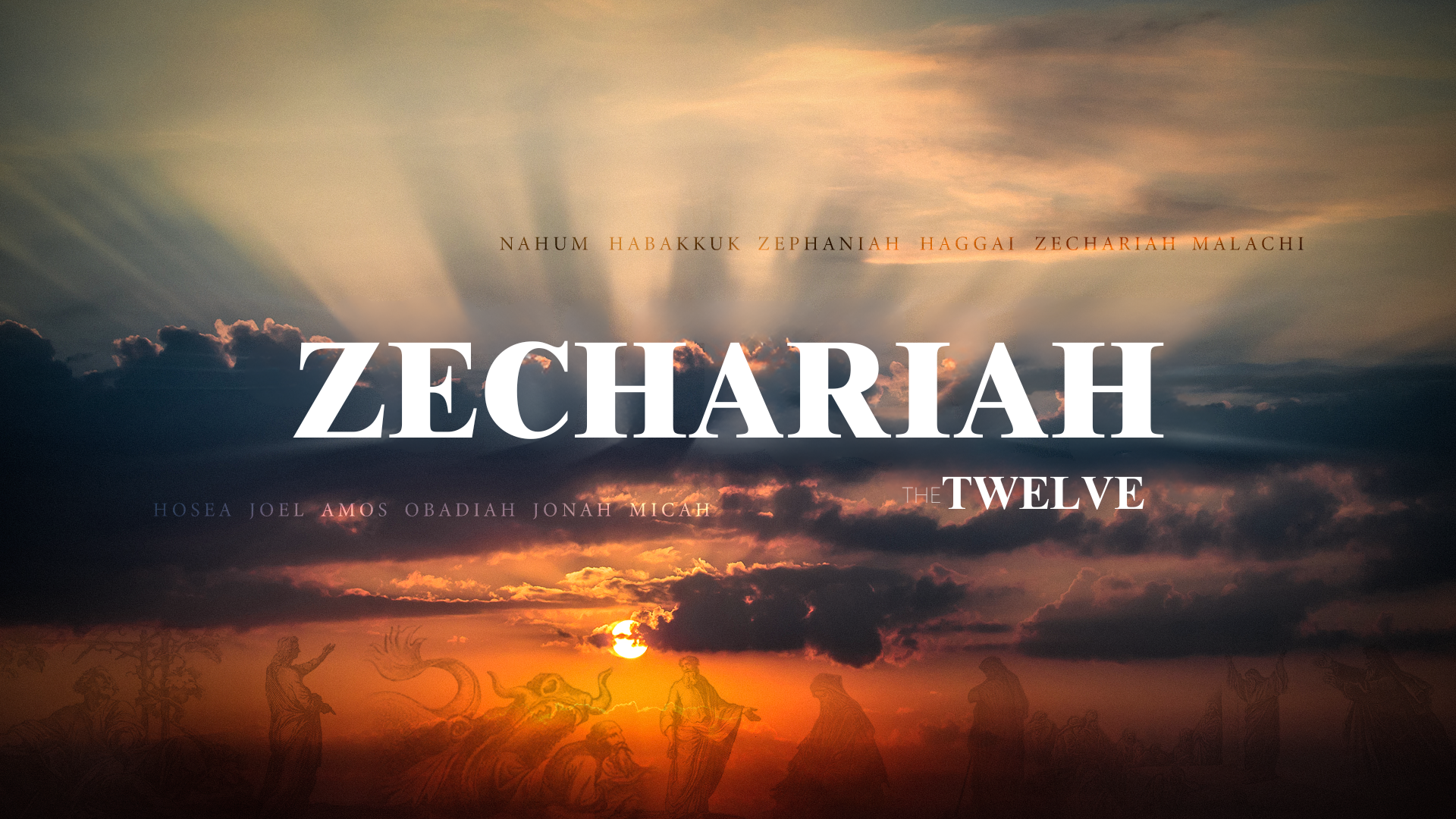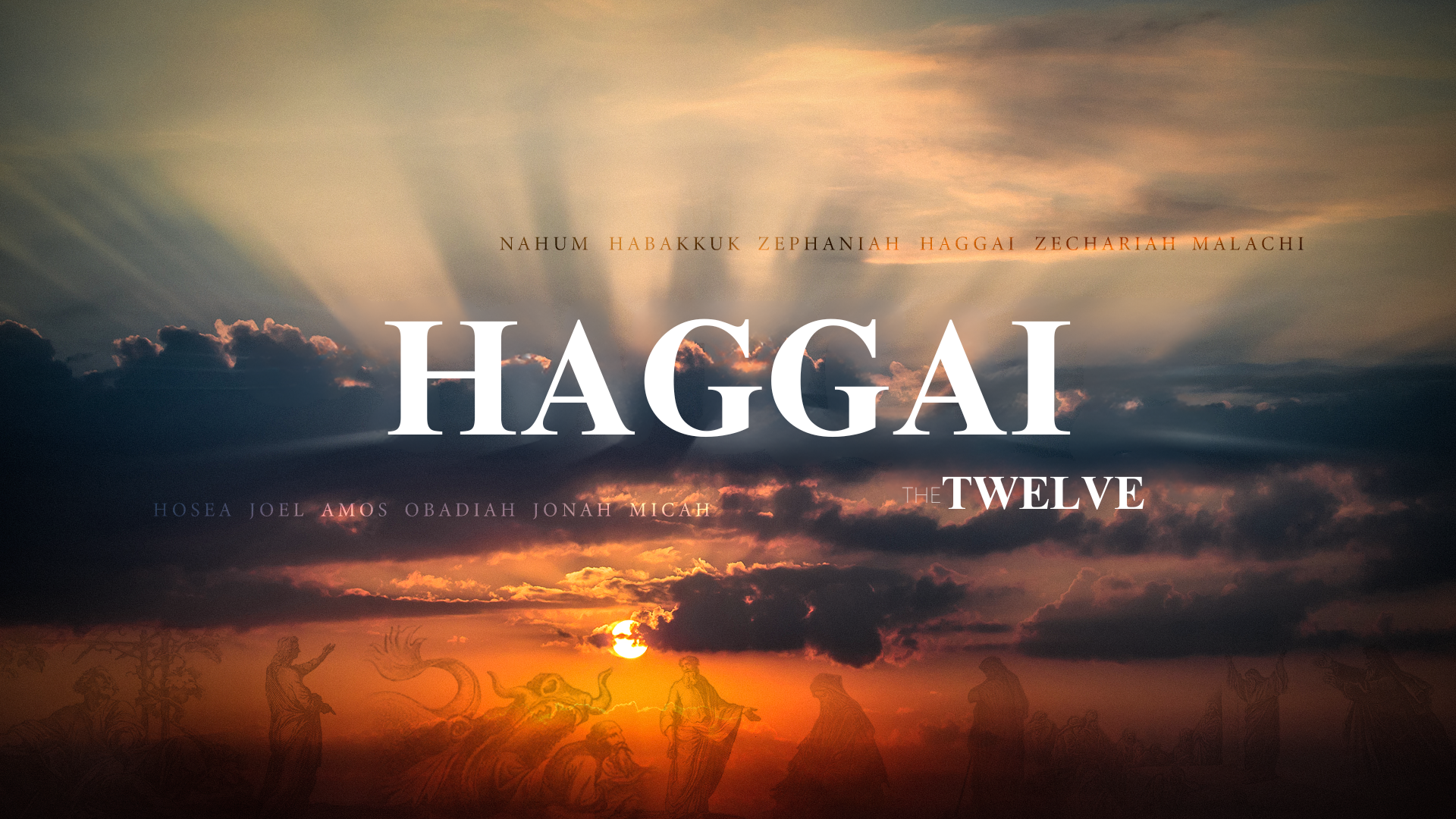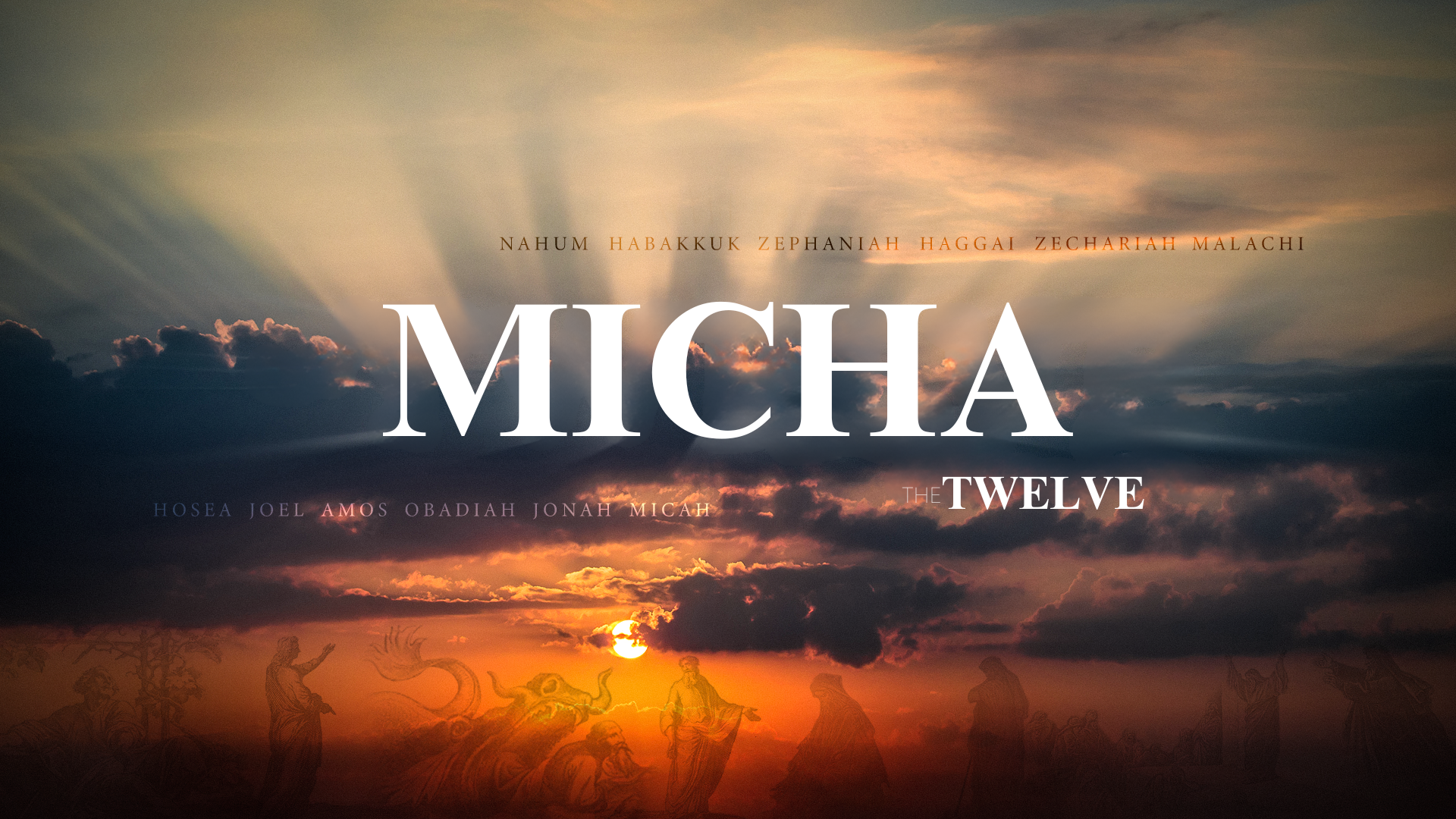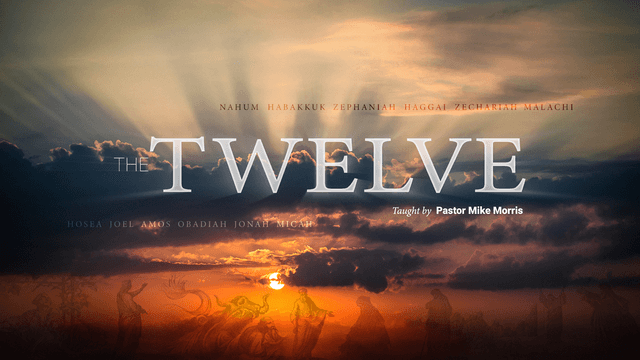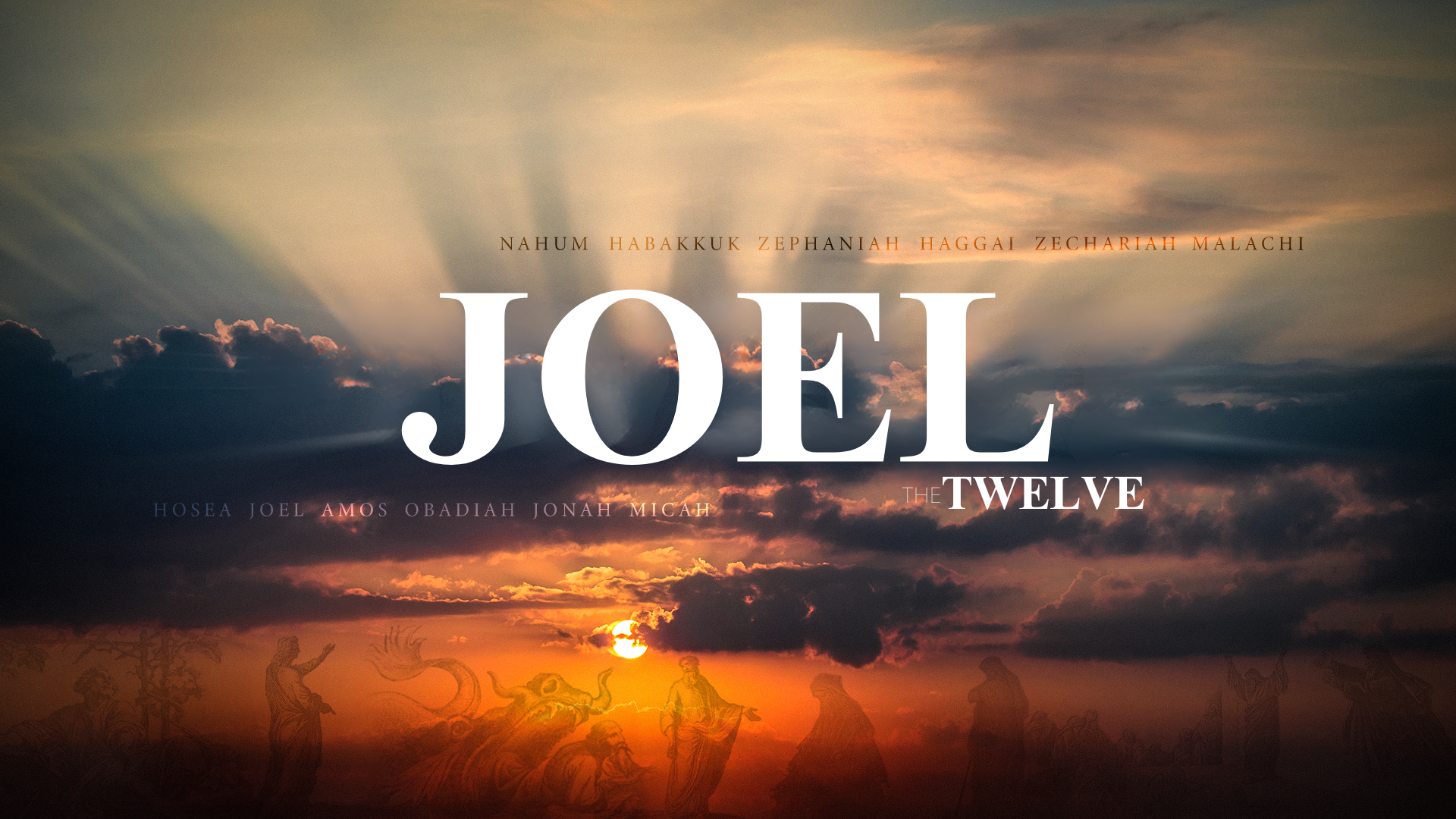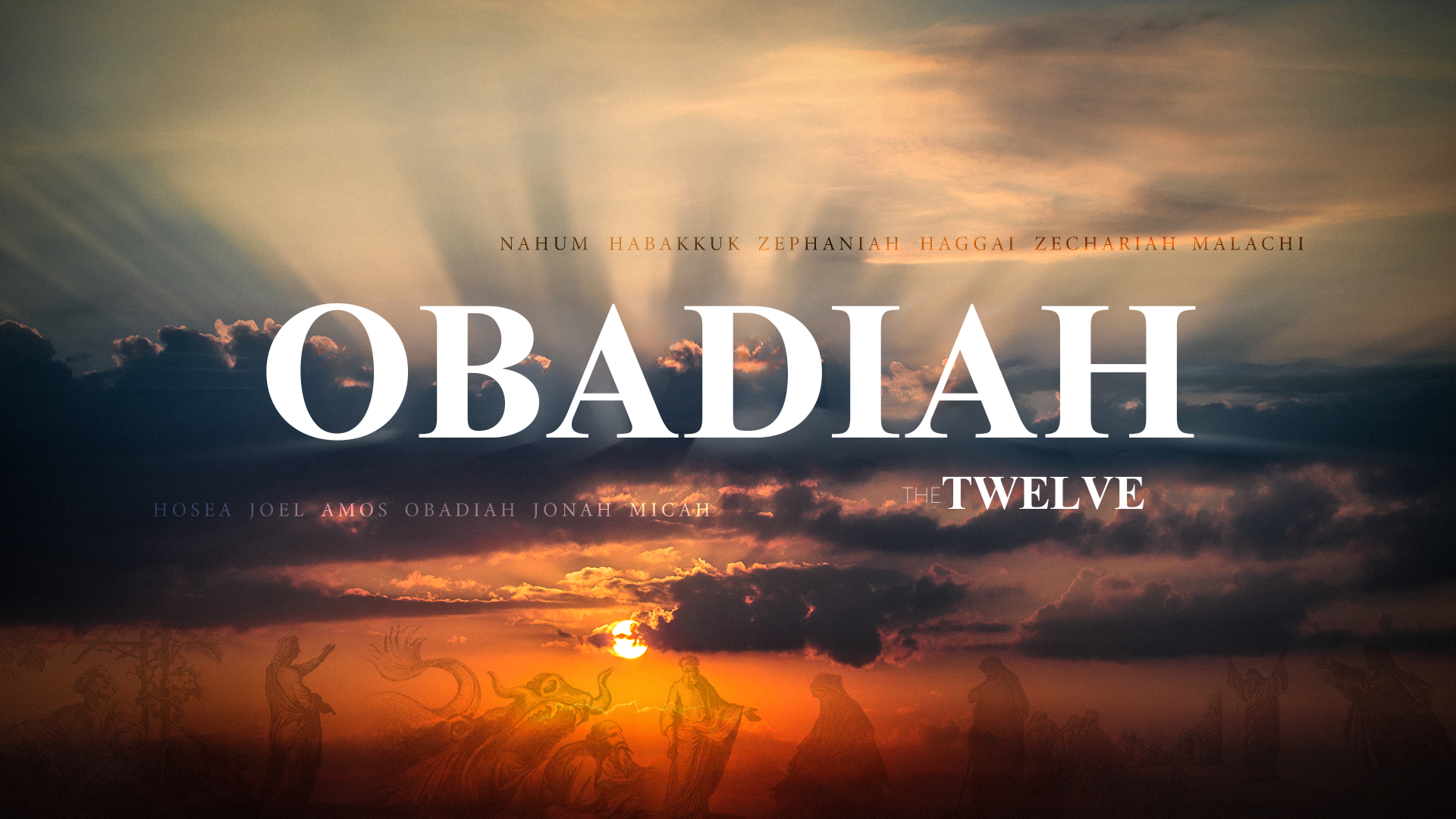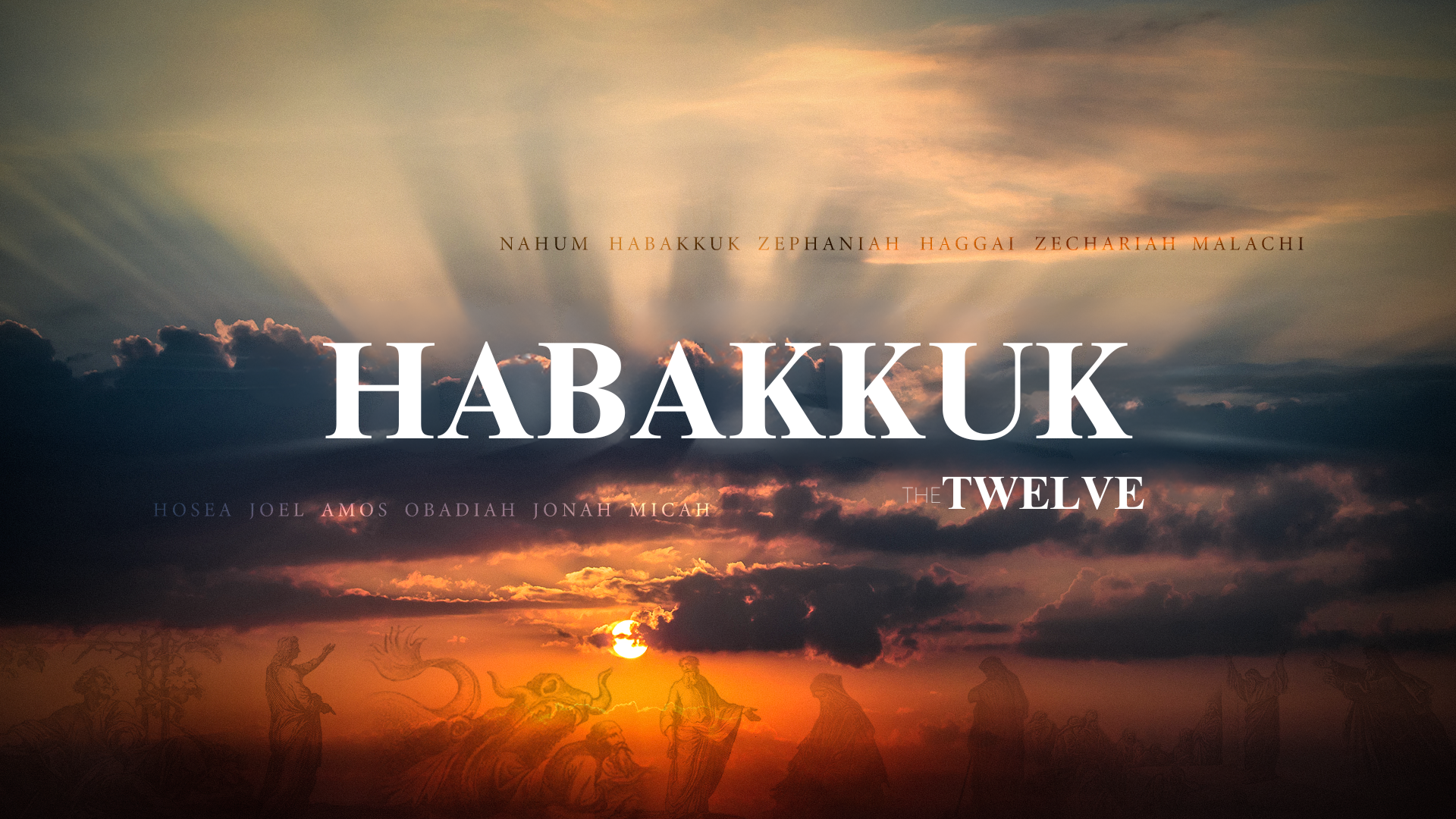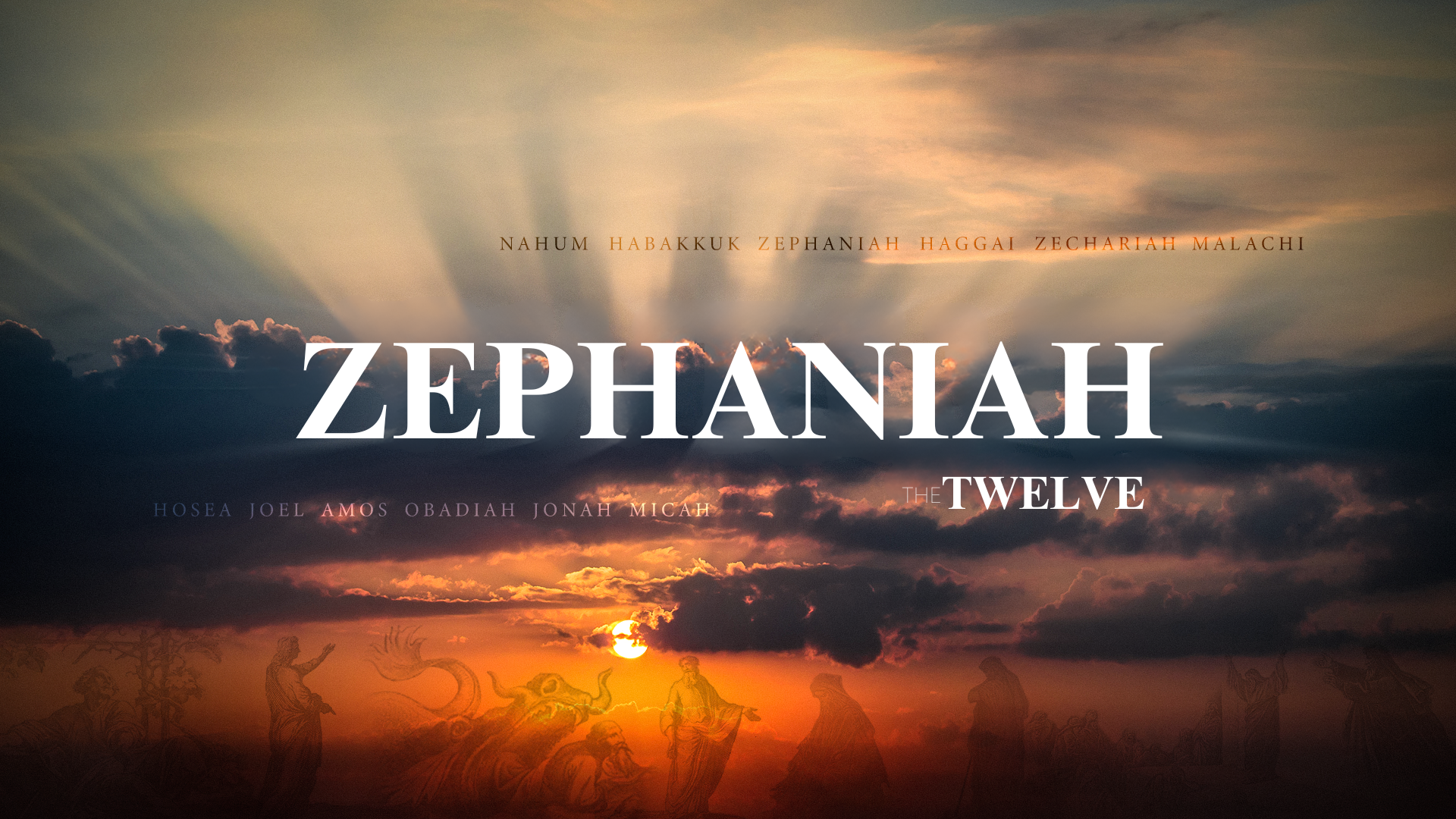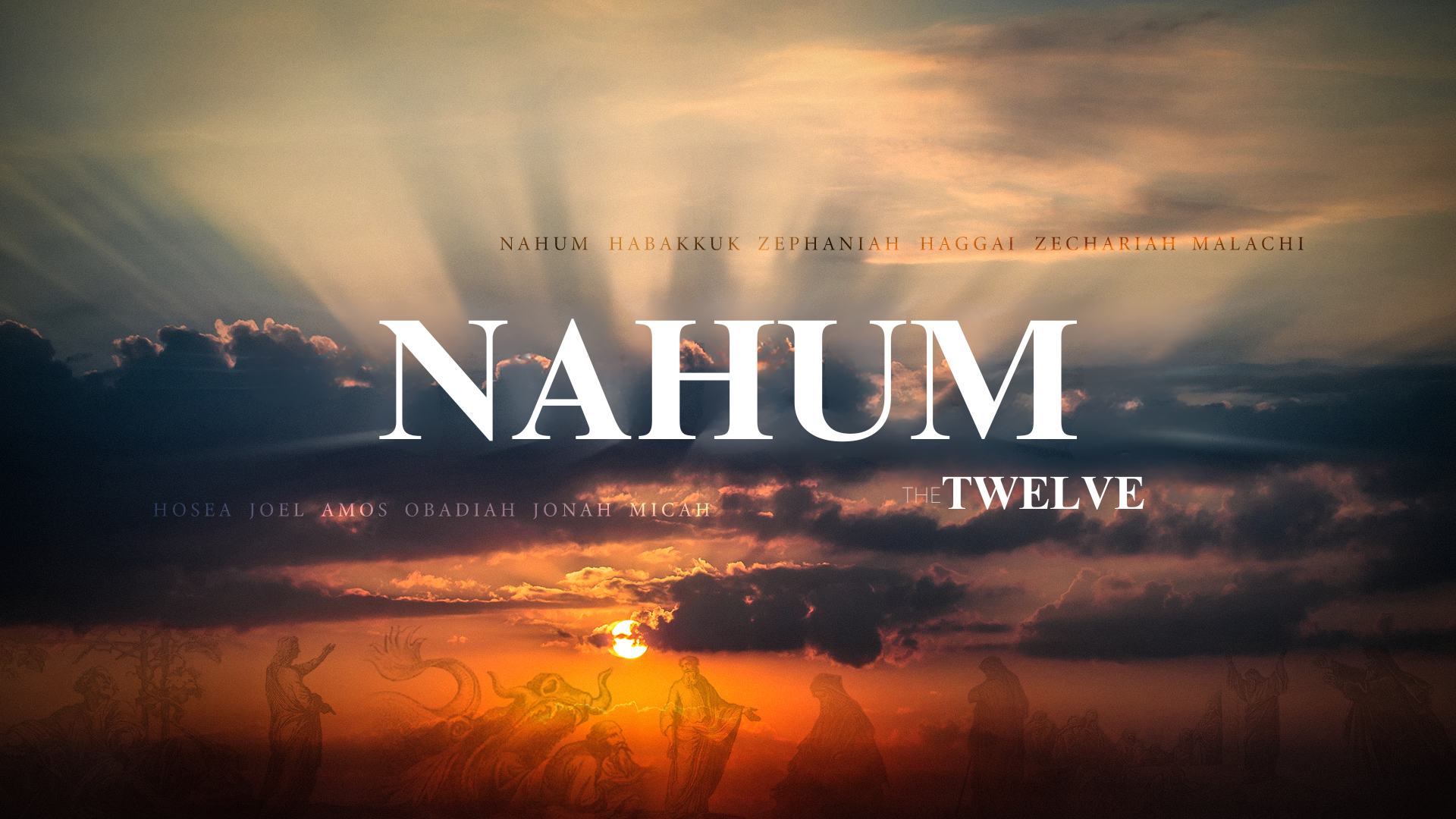MANUSCRIPT
Last week we finished our study of chapter 5, the end of the second oracle, and the home of an important messianic prophecy in verse 2...in that chapter, we saw a description of God’s work in and through the great Shepherd-King of Israel, and in and through the remnant of Jacob, God’s people...today we will cover the first half of chapter 6, which begins the third oracle of Micah’s prophecy...
The book of Micah is the transitional prophecy of the Twelve, the bridge between the prophets who spoke primarily to Israel in the north and those who spoke primarily to Judah in the south...he spoke a message of both judgment and restoration...a final word of judgment to the north, and a word of warning but also of hope for the south, Judah...his message stands alongside his contemporaries, falling chronologically among the major prophets between Isaiah and Jeremiah...
This slide places him as the first prophet speaking to Judah, during the reign of Hezekiah, and he is followed by the prophet Nahum, about fifty years later...
Now as we turn to chapter 6, the beginning of Micah’s third and final oracle...this week we find ourselves in a court room, listening to a case being argued...but it’s not a criminal case, or even a civil case, it’s what today we would call a family law case...and we also find the second best-known passage in the book in this chapter, the covenant ethical mandate of verses 6 through 8
This chapter is a great example of a covenant lawsuit oracle...much of this book, and the previous books directed toward Israel, are mostly composed of judgment oracles... statements of the sins of the people and God’s decision to discipline them for those sins, usually idolatry and injustice in the covenant community...today’s passage is different...it’s more like chapter 1.2-7 in its form and structure, and other OT passages...it begins with the same opening as chapters 1 and 3 -- Hear what the Lord says -- the prophetic call -- but then changes style as the Lord speaks to the people in verse 3...
In outline form, I would separate it into two portions: verses 1 through 5 (Plead your case), and verses 6 through 8 (What does
Let’s jump in at verse 1...
Hear what the Lord says:
Arise, plead your case before the mountains,
and let the hills hear your voice.
2 Hear, you mountains, the indictment of the Lord,
and you enduring foundations of the earth,
for the Lord has an indictment against his people,
and he will contend with Israel.
To set this in the context of a legal proceeding, the Lord God is the judge, but He’s also the plaintiff in this case...Micah fills the role of the prosecuting attorney, and Israel stands in the dock as the defendant...and in these first two verses, God seats the jury...He calls creation to stand and hear His complaint, His indictment against His people, and the people’s defense, should be able to offer any...He invites the heights of mountains and hills, to the depths of the earth, the enduring foundations of the earth, what Jonah calls “the roots of the mountains” ... creation is a fitting choice to hear the case, for the mountains and hills have seen first-hand, as it were, the idolatrous worship of the people of Israel “on every high hill and under every green tree” ... now as the Lord begins, we see His intent -- He will contend with His own people and expects them to make their defense...
Verses 3 through 5 summarize His case, beginning with two pointed questions posed to Israel...but note the tone...covenant language is still used, as God uses the term “My people” in verses 3 and 5 -- it’s definitely not the language of divorce we hear in Hosea, “you are not My people and I am not your God” ... still the accusation is clear...
3 “O my people, what have I done to you?
How have I wearied you? Answer me!
4 For I brought you up from the land of Egypt
and redeemed you from the house of slavery,
and I sent before you Moses,
Aaron, and Miriam.
5 O my people, remember what Balak king of Moab devised,
and what Balaam the son of Beor answered him,
and what happened from Shittim to Gilgal,
that you may know the righteous acts of the Lord.”
God challenges His people to tell Him how He has harmed them that they would abandon Him as they have, how He has burdened them with requirements too great to bear...they have no response at the end of verse 3, for what could they say? God had been amazingly gracious to them...it reminds us of the goodness of the Lord spoken of in the parable of the vineyard in Isaiah 5.3-4a
3 And now, O inhabitants of Jerusalem
and men of Judah,
judge between me and my vineyard.
4 What more was there to do for my vineyard,
that I have not done in it?
But still, this isn’t the same message as the judgment oracles of Amos or Hosea, or even earlier in Micah...this has the sense of a grieved and wounded husband seeking a true accounting from a spouse...a wayward spouse, but a spouse nevertheless...there is a tenderness that Judah is pure grace from the Lord...
In verse 4, God begins to lay out four events, four “righteous acts of the Lord” as verse 5 says, that are key to His indictment of His people and are the proof of His enduring love and grace toward them...let’s look at the events in order...as we do, you’ll see there is indeed an order to them...
The Lord turns to the ultimate example in the Old Testament of redemption...God’s rescue of His people from the bondage and slavery of life in Egypt...
4 For I brought you up from the land of Egypt
and redeemed you from the house of slavery,
The first righteous act of the Lord is the long-promised exodus from Egypt...as the Lord had said, He would bring His people up from their house of bondage to Pharaoh...one note here about Micah’s penchant for wordplay, the Hebrew words for “have I burdened you?” and “I have brought you up” are very similar...it draws attention to God saying, “I haven’t brought you down, I’ve brought you up...” -- it is certainly true of the Exodus event for Israel...Exodus 6.6-8 is a good summary...
6 Say therefore to the people of Israel, ‘I am the Lord, and I will bring you out from under the burdens of the Egyptians, and I will deliver you from slavery to them, and I will redeem you with an outstretched arm and with great acts of judgment. 7 I will take you to be my people, and I will be your God, and you shall know that I am the Lord your God, who has brought you out from under the burdens of the Egyptians. 8 I will bring you into the land that I swore to give to Abraham, to Isaac, and to Jacob. I will give it to you for a possession. I am the Lord.’”
This was a foundational moment for Israel -- they saw His Hand at work, through the plagues on the Egyptians and God’s protection of them, culminating with the death of the firstborn of Egypt and the institution of the Passover...the lesson they learned was that God keeps His promises...when He says He will deliver you, He will deliver you...
The second “righteous act of the Lord” is His provision of human leadership for the people in the persons of Moses, Aaron, and Miriam, maybe the best known trio of siblings in the Scripture, all from the tribe of Levi...Moses the Lawgiver, perhaps Israel’s greatest leader yet not a king, a man God greatly used to bring Israel out, lead them through the wilderness, and to the very border of the promised land of Canaan...he had his flaws, as we all do, but following Moses’s death, Deuteronomy 34.10-12 gives us the assessment of Scripture about the life of Moses, in the last three verses of the first five books of the Old Testament, called the Pentateuch or simply the books of Moses...
10 And there has not arisen a prophet since in Israel like Moses, whom the Lord knew face to face, 11 none like him for all the signs and the wonders that the Lord sent him to do in the land of Egypt, to Pharaoh and to all his servants and to all his land, 12 and for all the mighty power and all the great deeds of terror that Moses did in the sight of all Israel.
Used by the Lord in so many ways, Moses was a great gift to the people of Israel and the people of the church...eighty times the Scripture says that the Lord or God spoke to Moses...truly a remarkable man and uniquely used of the Lord...
His brother, Aaron, was, as the Lord said, the “mouth” of Moses...his spokesman, and thus God’s spokesman, the first priest, and the head of the priests and Levites...the first to wear the garments of the high priest...also a great leader, but perhaps a bit more flawed than Moses...Exodus 4.27-30 gives us an overview of Aaron’s important role... 27 The Lord said to Aaron, “Go into the wilderness to meet Moses.” So he went and met him at the mountain of God and kissed him. 28 And Moses told Aaron all the words of the Lord with which he had sent him to speak, and all the signs that he had commanded him to do. 29 Then Moses and Aaron went and gathered together all the elders of the people of Israel. 30 Aaron spoke all the words that the Lord had spoken to Moses and did the signs in the sight of the people.
And Miriam, their sister, who also struggled with Moses’s leadership at times, but whom the Scripture describes as a prophetess, a musician, and a singer...a praise and worship leader of sorts...Exodus 15.20-21 tells us this..
20 Then Miriam the prophetess, the sister of Aaron, took a tambourine in her hand, and all the women went out after her with tambourines and dancing. 21 And Miriam sang to them: “Sing to the Lord, for he has triumphed gloriously; the horse and his rider he has thrown into the sea.”
The third “righteous act of the Lord” is found in Micah 6 verse 5...
5 O my people, remember what Balak king of Moab devised,
and what Balaam the son of Beor answered him,
This refers to the rather lengthy story in Numbers 22 through 24, as Balak the king of Moab, east of the Dead Sea, calls upon Balaam son of Peor, a man skilled in divination, yet one whom the Scripture records was visited by God Who spoke to him...the point of this reference here is that though Balak asked three times for Balaam to curse Israel, three times Balaam blessed them by God’s instruction...for a people to whom blessings and curses were very significant, God leading Balaam to bless and not curse Israel was exceedingly important...and frustrating to Balak...Numbers 24.10...
10 And Balak's anger was kindled against Balaam, and he struck his hands together. And Balak said to Balaam, “I called you to curse my enemies, and behold, you have blessed them these three times.
Whatever else his flaws were, Balaam got one thing right -- as he said, ‘All that the Lord says, that I must do’?”
The fourth “righteous act of the Lord” was God’s provision for Israel’s crossing over the Jordan River into the promised land... and what happened from Shittim (Shee - teem) to Gilgal,
(MAP SLIDE) Their last encampment on the eastern side of the Jordan was at Shittim, on the eastern side, in Moab, just north of the Dead Sea...their first encampment on the western side was Gilgal, a few miles northeast of Jericho
So many important works of God accompanied the entrance into the Land...the story of the two spies sent out from Shittim to Jericho and their encounter with Rahab; the consecration of the people; the bearing of the ark of the covenant of the Lord of all the earth into the waters of the Jordan, and the waters standing in a wall far away to their right, to the north, as Joshua 3.17 tell us...
17 Now the priests bearing the ark of the covenant of the Lord stood firmly on dry ground in the midst of the Jordan, and all Israel was passing over on dry ground until all the nation finished passing over the Jordan.
And what was Micah’s point of recounting these episodes from Israel’s history?
that you may know the righteous acts of the Lord.”
This is the plaintiff, the Lord God, telling His estranged people, that He has done all that could possibly be done for them, for their good and benefit...and now the people respond in verse 6 and following...
6 “With what shall I come before the Lord,
and bow myself before God on high?
Shall I come before him with burnt offerings,
with calves a year old?
7 Will the Lord be pleased with thousands of rams,
with ten thousands of rivers of oil?
Shall I give my firstborn for my transgression,
the fruit of my body for the sin of my soul?”
8 He has told you, O man, what is good;
and what does the Lord require of you
but to do justice, and to love kindness,
and to walk humbly with your God?
Now the people of Israel respond to the charges by debating what sacrifices God would demand of them...they acknowledge He deserves their outward worship...they will come before Him and bow...and what should they bring?
Burnt offerings? Yearling calves were very expensive, and burnt offerings returned nothing to the worshipper, as other sacrificial offerings did..
Then they go to extremes that they can’t even offer on a personal scale...thousands of rams...ten thousands of rivers of oil...ridiculous amounts of offerings not seen since Solomon dedicated the Temple...
And then the warped minds and hearts of the people turn to an idea that was completely repulsive to their God: the offering of their firstborn children...a pagan Canaanite practice prohibited by Israel’s God and entirely unacceptable as any kind of offering...it was common among the nations and people surrounding Judah, and the concept had crept into their own thinking, despite the clear teaching of the Law of God in Leviticus 18.21...
21 You shall not give any of your children to offer them (make them pass through the fire) to Molech (a false god), and so profane the name of your God: I am the Lord.
The people have proven their inadequate understanding of how to approach their God and of what He desires and expects from them...Micah now responds...what he says next in verses 6 through 8 have been called “the finest summary of the content of practical religion to be found in the OT.” and “a one-line summary of the whole Law.”
8 He has told you, O man, what is good;
and what does the Lord require of you
but to do justice, and to love kindness,
and to walk humbly with your God?
This is the central ethical mandate in the book, and perhaps in the Old Testament...we must remember what comes before this simple yet profound verse...a perverse twisting of the Law in an wrongful attempt to satisfy their deity...in contrast, this is a clear and memorable reduction of the essence of the Law to a single sentence...the Lord does require of all mankind that we do justice...relentlessly pursue right and ethical treatment of all people, not a select few who are just like us...we are to love kindness, love it so much that our lives are characterized by, known for, marked by genuine kindness, gentleness, and compassion in every encounter and at every moment...and beyond our relationships with others, described by the first two phrases, we are to walk humbly with our God...in right relationship to Him and His word...living out lives of obedience and trust before Him, connected to and walking with Him not in pride but in humility, putting away earthly desires for the rewards of a life of righteousness and holiness, lived in fellowship with the Almighty God...God’s heart is for all His people to be near Him...
Deuteronomy 10.12-13 provides a similar summary of the heart of God’s Law...
12 “And now, Israel, what does the Lord your God require of you, but to fear the Lord your God, to walk in all his ways, to love him, to serve the Lord your God with all your heart and with all your soul, 13 and to keep the commandments and statutes of the Lord, which I am commanding you today for your good?
God requires that we fear God, walk in His ways, love Him, serve Him, and keep His commandments...observe justice, love kindness, walk in humility with our God...on this short summary the Law and the Prophets agree...
But at this point, we must be very clear...these summaries are not a description of what one must do to be saved, to come to Jesus, to enter into the life of faith in God...they are not God’s divine task list that we have to check off one item after another, in our own power, in order for us to be acceptable to Him...for those in Judah in Micah’s day, this verse reduced the essence of the Law to a single statement, but it was a Law which could not be fully kept and thus could not save...Paul reminds us in Galatians 2.16...
16 yet we know that a person is not justified by works of the law but through faith in Jesus Christ, so we also have believed in Christ Jesus, in order to be justified by faith in Christ and not by works of the law, because by works of the law no one will be justified.
The Law has many purposes...one is to show us the divine moral character of God...when we see the purity and holiness of the Ten Commandments, we see something of Who God is...in His essence, His personality, His behavior...in this sense, we follow the moral Law of God so we can be like Him...imitate Him, in a sense...as Peter says in I Peter 1.14-16...
14 As obedient children, do not be conformed to the passions of your former ignorance, 15 but as he who called you is holy, you also be holy in all your conduct, 16 since it is written, “You shall be holy, for I am holy.”
But in Galatians 3.23-24 Paul tells us another important purpose of the Law...it was given to guide us, to be our tutor, our guardian, until Christ came...
23 Now before faith came, we were held captive under the law, imprisoned until the coming faith would be revealed. 24 So then, the law was our guardian until Christ came, in order that we might be justified by faith.
God’s intent is not to give us the Law so we can be made right with Him...as Paul said, a person is not justified by works of the Law...but what it does do is point out our inability to keep it...that is evident both from Scripture and from human experience...
Because ultimately what God really wants isn’t burnt offerings, thousands of rams and ten thousands of rivers of oil...sadly, the people of Israel offered everything except what God wanted -- their own hearts, their loyal, their true devotion...for really, that’s all we have to give, anyway...(SLIDE)
Micah 6.8 doesn’t describe what to do in order to be saved...it describes what a saved life of faith and trust is, lived out in practical terms every day...people who know Jesus, who are indwelt by the Holy Spirit, walking with the Father each day, will do justice to those around them, they will love kindness and be kind to others, and they will walk in true humility with God...the only way to do what God requires is to acknowledge that in our own ability we can’t, and then turn to Him for the power and strength to walk with Him...that’s a life lived in worship, in Spirit, and in truth...
As we close, I’d like to give you some questions to think about, based on the righteous acts of the Lord in the Exodus, Micah’s reminders to the people of Israel...let’s bring them forward to us today
(SLIDE) From what has God delivered you? What situation did you think was hopeless, but God overcame your circumstances? For the Israelites it was bondage in Egypt...what about you?
(SLIDE) What godly leaders has the Lord placed in your life? Note that God named not just Moses, but Aaron and Miriam, too...He blesses each of us through other people...for whom do you give thanks to God?
(SLIDE) How has God protected you from temptation and evil? To think of it another way, what has the world, the flesh, and the devil meant for evil, but that God has turned to your good?
(SLIDE) How has God led you into a new place of blessing? Has He moved you from the wilderness of confusion and anxiety to a new place, a place He made just for you, where you are truly home?
Maybe some of these blessings are already accomplished in your life...maybe some are still future tense for you...either way, we can give thanks for all the goodness our loving God has poured into our lives
And one more thing: let us remind ourselves that we are not saved because we manage to keep the Law...instead, let our struggle with besetting sin drive us back to the Holy Spirit who lives within us, to our Good Shepherd, Jesus Christ, and to our caring and compassionate Father, that we turn to Him in faith and find we are made right with Him, not through our own strength, but only because of the shed blood and unstoppable love of our Saviour...for when we know Him well, we will walk with Him each day

Taught by Mike Morris
Associate Pastor of Verse By Verse Fellowship
The Twelve Series
